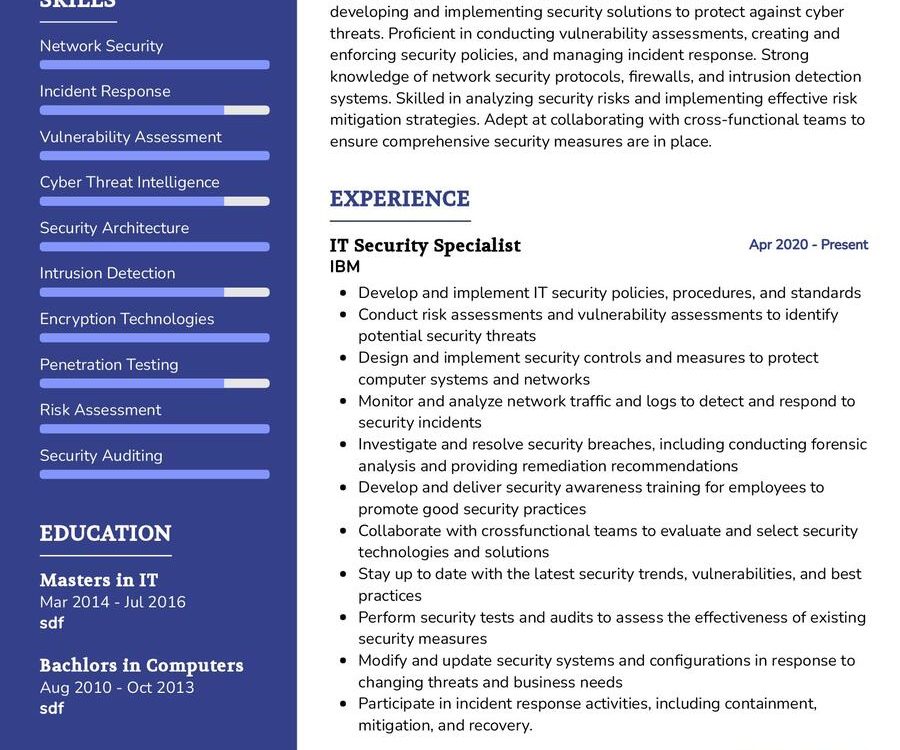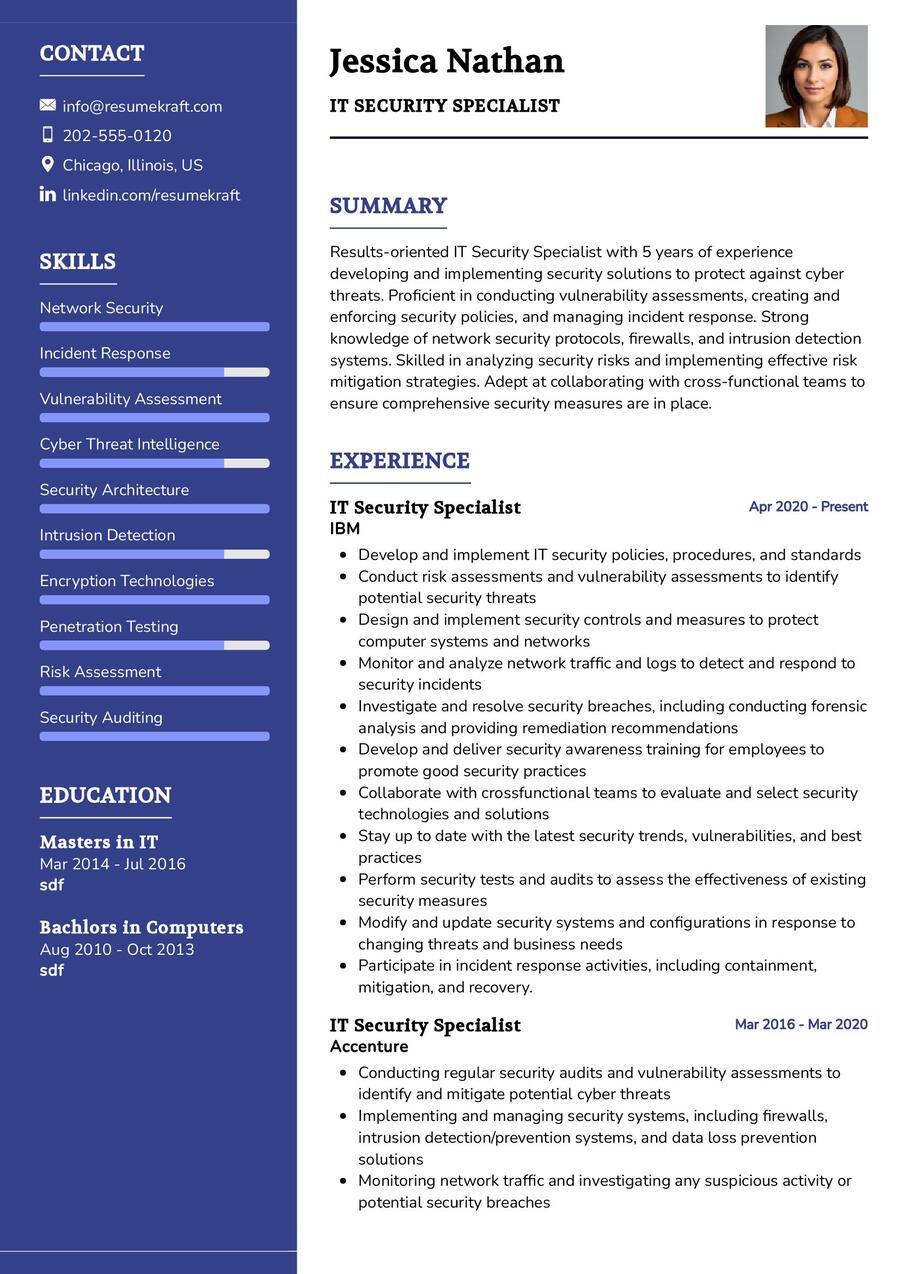Understanding the Role of an IT Security Specialist
As the digital landscape becomes more complex, the role of an IT Security Specialist is crucial in safeguarding organizations against evolving cyber threats. This position demands a unique blend of technical expertise and strategic thinking to ensure the confidentiality, integrity, and availability of sensitive information. Let’s explore the multifaceted responsibilities and qualifications that define the role of an IT Security Specialist.
Job Requirements for an IT Security Specialist
Becoming an IT Security Specialist requires meeting specific educational and professional criteria. Let’s delve into the key prerequisites to embrace this role:
- A Bachelor’s or Master’s degree in Computer Science, Cybersecurity, or a related field, showcasing a strong foundation in the technical domain.
- Deep knowledge of cybersecurity frameworks, protocols, and best practices.
- Hands-on experience in conducting vulnerability assessments, penetration testing, and implementing security solutions.
- Proficiency in security technologies such as firewalls, antivirus programs, and intrusion detection systems.
- Excellent communication skills to convey complex security concepts to non-technical stakeholders.
- Up-to-date certifications, such as Certified Information Systems Security Professional (CISSP) or Certified Ethical Hacker (CEH).
- Ability to stay informed about the latest cyber threats and mitigation strategies.
Securing additional certifications in specialized areas of cybersecurity can enhance your profile in the competitive job market.
Responsibilities of an IT Security Specialist
The role of an IT Security Specialist encompasses a wide array of responsibilities, each contributing to the overall cybersecurity posture of an organization. Let’s unravel the core duties that define this role:
- Developing and implementing cybersecurity policies and procedures to protect sensitive data.
- Conducting regular security audits and risk assessments to identify vulnerabilities.
- Responding to and mitigating security incidents, ensuring minimal impact on business operations.
- Collaborating with IT teams to integrate security measures into the overall IT infrastructure.
- Providing security awareness training to employees to foster a culture of cybersecurity.
- Staying informed about emerging cyber threats and adapting security measures accordingly.
- Ensuring compliance with relevant industry regulations and standards.
Each responsibility demands a high level of diligence and adaptability in the ever-changing landscape of cybersecurity.
Crafting an Effective IT Security Specialist Resume
Your resume plays a pivotal role in showcasing your qualifications and experiences as an IT Security Specialist. Here are some tips to create a compelling resume:
- Highlight your experience in implementing successful cybersecurity measures, including specific examples of threat mitigation.
- Showcase your involvement in security audits and risk assessments, emphasizing your proactive approach.
- Quantify your achievements, such as the percentage reduction in security incidents under your watch.
- List relevant certifications prominently to demonstrate your commitment to ongoing professional development.
- Customize your resume for each application, aligning your skills with the specific job requirements.
Your resume should serve as a reflection of your expertise and contribute to setting you apart in a competitive job market.
IT Security Specialist Resume Summary Examples
Your resume summary is the gateway to your professional journey, providing a snapshot of your skills and achievements. Here are some examples to inspire you:
- “Results-driven IT Security Specialist with over 8 years of experience, adept at developing and implementing robust cybersecurity measures that meet industry standards.”
- “Detail-oriented and certified IT Security Specialist with a track record of conducting comprehensive security audits, ensuring the highest level of data protection.”
- “Experienced IT Security Specialist with a strong foundation in threat mitigation and incident response, dedicated to staying ahead of emerging cyber threats.”
Your resume summary should be concise yet powerful, leaving a lasting impression on potential employers.
Building the Experience Section of Your IT Security Specialist Resume
Your experience section is the heart of your resume, providing a narrative of your career journey. Here are examples to guide you in showcasing your expertise:
- “Led a team in developing and implementing a company-wide cybersecurity policy, resulting in a 30% reduction in security incidents over a year.”
- “Played a key role in responding to a major security incident, minimizing downtime and ensuring minimal data compromise.”
- “Implemented a robust firewall solution, enhancing the organization’s defense against external threats.”
Each experience listed should convey not just your responsibilities but the impact you made in enhancing cybersecurity.
Education Section for Your IT Security Specialist Resume
Your educational background provides the foundation for your expertise. Showcase it effectively in your resume:
- Master of Science in Cybersecurity, XYZ University, 2016.
- Bachelor of Science in Computer Science, ABC University, 2014.
- Certified Information Systems Security Professional (CISSP), 2017.
Your education section should emphasize the depth of your knowledge in cybersecurity.
Skills Essential for an IT Security Specialist Resume
Your skill set is the toolkit that sets you apart as an IT Security Specialist. Here are the essential skills you should showcase:
Soft Skills:
- Analytical thinking and problem-solving, crucial for identifying and mitigating security risks.
- Effective communication, both in conveying technical details to non-technical stakeholders and collaborating with team members.
- Attention to detail, ensuring thorough security assessments and adherence to protocols.
- Adaptability, crucial in responding to evolving cyber threats.
- Leadership skills, particularly in managing and guiding a team in crisis situations.
Hard Skills:
- Expertise in cybersecurity frameworks and best practices.
- Hands-on experience with security tools and technologies.
- Familiarity with industry regulations and compliance standards.
- Incident response and crisis management skills.
- Continuous monitoring and auditing capabilities.
Each skill you possess is a valuable asset in ensuring robust cybersecurity measures.
Common Mistakes to Avoid in Your IT Security Specialist Resume
Steer clear of common pitfalls when crafting your resume to ensure it stands out for the right reasons:
- Avoid generic resumes; tailor each application to the specific job requirements.
- Highlight achievements rather than listing only job duties.
- Include a well-crafted cover letter to provide a more personal touch to your application.
- Use industry-specific terms judiciously, ensuring your resume remains accessible to all readers.
- Proofread thoroughly to present a polished and professional image.
Avoiding these mistakes will contribute to a resume that effectively communicates your value as an IT Security Specialist.
Key Takeaways for Your IT Security Specialist Resume
As you create your IT Security Specialist resume, keep these key points in mind:
- Emphasize your success stories in implementing cybersecurity measures.
- Showcase your proactive approach through involvement in security audits and risk assessments.
- Quantify your achievements to provide a tangible impact on your resume.
- Highlight relevant certifications prominently to demonstrate ongoing professional development.
Your resume is your professional narrative, and a well-crafted one can open doors to exciting career opportunities in the field of IT security.
Finally, feel free to utilize resources like AI Resume Builder, Resume Design, Resume Samples, Resume Examples, Resume Skills, Resume Help, Resume Synonyms, and Job Responsibilities to create a standout application and prepare for the IT Security Specialist job interview.


